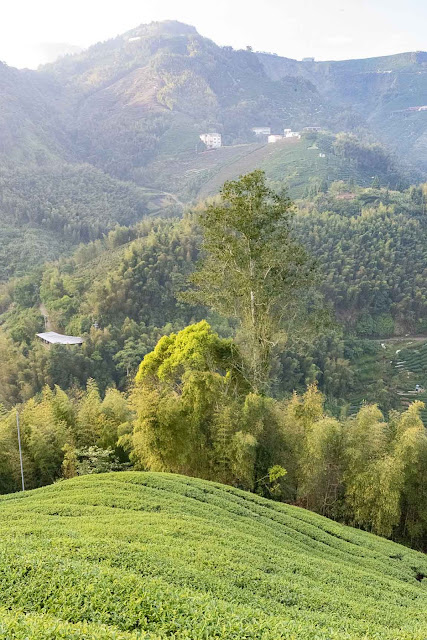The word 'Shan Tou Qi', energy of the mountain, is the equivalent of the word terroir in French. It refers to common characteristics shared by produces coming from the same region. Indeed, it's possible to distinguish a Bordeaux red wine from a Napa Valley red and a Shan Lin Xi Oolong from an Alishan. But does it mean that all high mountain Oolongs from a specific mountain taste the same? That they are of the same quality? No, just like with wine, there are still great differences within the same mountain. For instance, you can experience the difference between these 2
AliShan Oolongs from 2 different plantations. Or
2 Ali Shan from the same plantation and
2 different days (organic 1 and 2). Or you can taste the difference in Shan Lin Xi, with Qingxin Oolong harvested from this plantation on
May 3rd (Day 1) and
May 4th (Day 2). The difference is larger than what I expected and shows how both the weather on the day of harvest and slight changes in the process can have great impact on the flavors of high mountain Oolong.
The next picture shows how plantation management also matters:
 |
| Side by side plantations in Shan Lin Xi |
A simple red rope separates 2 plantation in the middle of the picture. The plantation on the right is where I get my Shan Lin Xi high mountain Oolongs. What is amazing is how much darker and greener the color of the leaves in the field on the left. (Both fields have already been harvested.) This is evidence that the way the trees are treated, which kind of fertilizer is used and if pesticides are used or not does matter a lot. My farmer's only property and source of income is this field, so he tells me that he uses only the most natural fertilizer and that he didn't spray any pesticides. For him, this explains the color difference in the leaves with the adjacent field. We don't know how the other farmer manages his field and I'm not saying that yellow is better than dark green. But this is evidence that not even from the same tea mountain there are differences from one plantation to another.
And that's why tasting is fun and interesting. Tea isn't a commodity, but it's the most sensitive product I know. Everything has an impact on its flavors: the mountain, the field management, the weather during harvest, the time of the harvest, the season, the cultivar, the process... and the brewing!!










No comments:
Post a Comment